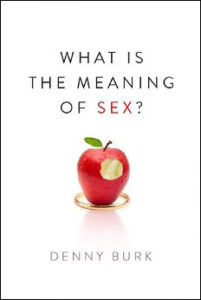Review: What is the Meaning of Sex? by Denny Burk
At the risk of stating the obvious, sex is a big deal. Not only is it a big deal, but it’s currently the source of much confusion for both Christians and non-Christians alike. One need only turn on the television to see the moral confusion regarding homosexuality, marriage and a host of other issues related to…
 At the risk of stating the obvious, sex is a big deal. Not only is it a big deal, but it’s currently the source of much confusion for both Christians and non-Christians alike. One need only turn on the television to see the moral confusion regarding homosexuality, marriage and a host of other issues related to sexual ethics.
At the risk of stating the obvious, sex is a big deal. Not only is it a big deal, but it’s currently the source of much confusion for both Christians and non-Christians alike. One need only turn on the television to see the moral confusion regarding homosexuality, marriage and a host of other issues related to sexual ethics.
Denny Burk’s new book, What Is the Meaning of Sex?, attempts to bring clarity to sexuality, which he considers “one of the touchstone issues of post-Christian America.”
“Christian faithfulness in our generation requires that we be prepared to apply the Word of God to the gritty issues of life,” Burk writes.
In other words, Christian faithfulness requires that Christians consider the ultimate purpose of their sexuality. To this end, Burk encourages readers to, as the apostle Paul said, “Glorify God with your body.” The glory of God, Burk argues, is the ultimate purpose, and therefore the ultimate meaning, of sexuality.
Burk advances his thesis by employing a primarily teleological approach to sexual ethics, an approach that judges a human action in light of its goal or purpose. Burk calls his approach a “blended approach that gives a privileged place to teleology within the framework of divine revelation.” This blend includes some aspects of character ethics and deontology in addition to the focus on teleology.
While he is most concerned with the ultimate purpose of sex, Burk does not discount the consideration of subordinate purposes, like consummation of marriage, procreation, expression of love and pleasure. He focuses on the ultimate purpose because other sex ethics books, some of which he interacts with, display “a failure to distinguish ultimate ends from subordinate ends.”
Burk uses his blended ethical approach to address a range of issues – including hermeneutics, marriage, conjugal relations, family planning, gender, sexuality and singleness – and applies the Bible’s teaching to the contemporary confusion on each.
One particularly helpful subject that Burk addresses is family planning. After articulating the effects and misuse of contraceptive technologies, Burk offers six principles for a Christian couple’s use of birth control, concluding that “the only forms of birth control that could possibly be valid are those that prevent contraception. Those that cause the destruction of a fertilized egg or fetus violate the scriptural prohibition ‘Thou shalt not kill.’”
Burk finishes the chapter by assessing the more controversial forms of contraception, like the birth control pill and the morning-after pill, and by stating that Christian couples can glorify God in their family planning by stewarding “their procreational powers in line with God’s purposes.” Couples should steward their procreational powers for kingdom purposes, not for selfish ends, according to Burk.
“Couples that desire to keep the family circle small must ask themselves if they have been unduly influenced by the spirit of the age, which treats children as a drag on personal freedom and prosperity,” Burk writes.
This combination of clear articulation of the issue at hand, presentation of the Bible’s teaching and pastoral guidance for how to glorify God runs through each chapter.
Since sex falls under the category of “whatever you do” in 1 Corinthians 10:31, Christians had better know how to glorify God in it. What Is the Meaning of Sex? provides a well-researched, clear and biblical place to start for pastors and any Christian willing to think about these important, big deal issues.(Crossway 2013, $17.99)
_______________________________
In a recent interview, Dr. Burk offers these insights about his book:
Why is your book necessary?
What role does hermeneutics play in sexual ethics?
What challenges do the new sexual norms present for Christians and for the church?
Why should a pastor care about these issues?
Denny Burk serves as associate professor of biblical studies and ethics at Boyce College. Along with What is the Meaning of Sex?, he has co-authored several other books and written a number of articles. Dr. Burk comments daily on theology, politics and culture at www.DennyBurk.com. You can also connect with Dr. Burk on Twitter and Facebook .


